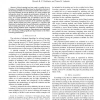IJCNN
2008
IEEE
14 years 6 months ago
2008
IEEE
IJCNN
2008
IEEE
14 years 6 months ago
2008
IEEE
— A major challenge in applying machine learning methods to Brain-Computer Interfaces (BCIs) is to overcome the on-line non-stationarity of the data blocks. An effective BCI syst...
IJCNN
2008
IEEE
14 years 6 months ago
2008
IEEE
Abstract— Meta-Learning has been used to predict the performance of learning algorithms based on descriptive features of the learning problems. Each training example in this cont...
IJCNN
2008
IEEE
14 years 6 months ago
2008
IEEE
— This paper presents a neural network model of demyelination of the mouse motor pathways, coupled to a central pattern generation (CPG) model for quadruped walking. Demyelinatio...
IJCNN
2008
IEEE
14 years 6 months ago
2008
IEEE
Abstract— We present a novel framework that applies a metalearning approach to clustering algorithms. Given a dataset, our meta-learning approach provides a ranking for the candi...
IJCNN
2008
IEEE
14 years 6 months ago
2008
IEEE
IJCNN
2008
IEEE
14 years 6 months ago
2008
IEEE
IJCNN
2008
IEEE
14 years 6 months ago
2008
IEEE
— This paper presents a Fuzzy ARTMAP (FAM) based modular architecture for multi-class pattern recognition known as Modular Adaptive Resonance Theory Map (MARTMAP). The prediction...
IJCNN
2008
IEEE
14 years 6 months ago
2008
IEEE
— We discuss sparse support vector machines (sparse SVMs) trained in the reduced empirical feature space. Namely, we select the linearly independent training data by the Cholesky...
IJCNN
2008
IEEE
14 years 6 months ago
2008
IEEE
—A novel wake-sleep learning architecture for processing a robot’s facial expressions is introduced. According to neuroscience evidence, associative learning of emotional respo...




